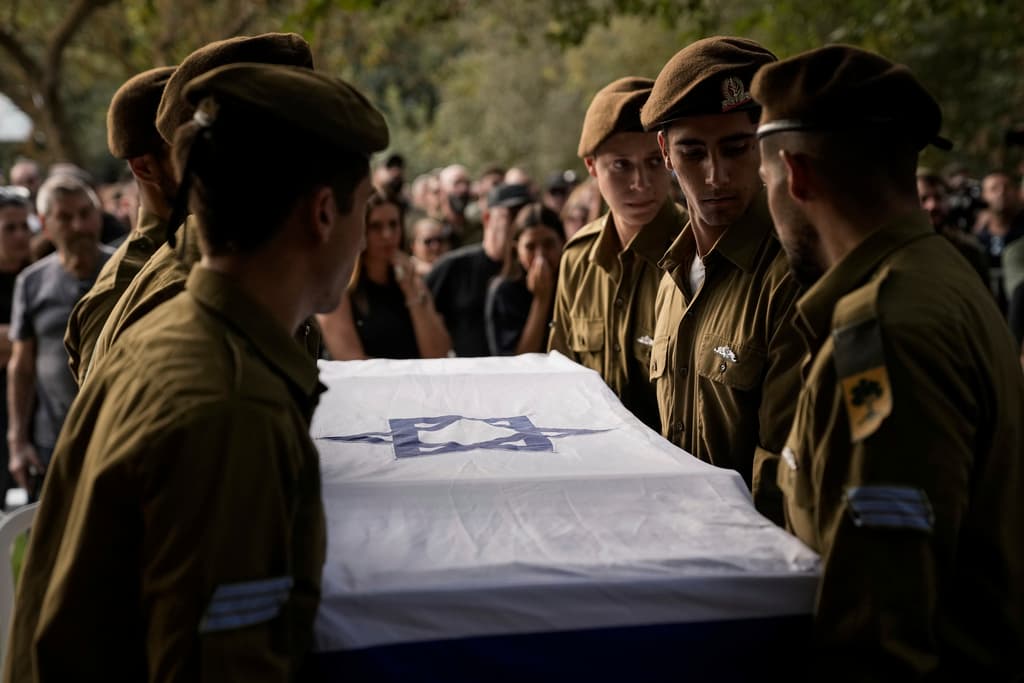Hezbollah Targets Tel Aviv Following Washington’s Warning to Israel on Attacking Lebanese Population Centers
In addition to American calls on Israel to end its assault on the terrorist organization, a global campaign to ease up on Hezbollah is brewing at the United Nations.

A White House admonition to Israel to ease up attacks on populated areas of Lebanon seems to have emboldened Hezbollah to intensify its targeting of Israeli cities, including a Monday ballistic missile attack against the Tel Aviv area.
Three ballistic missiles were launched at central Israel from Lebanon on Monday, forcing millions of people to seek shelter. The missiles were intercepted by the Israel Defense Force. A day earlier, a Hezbollah drone managed to evade IDF defenses, hitting an army base in northern Israel, killing four recently recruited trainees and injuring dozens of others.
The dramatic escalation followed the most public admonition yet from the White House over allegations that Israel is harming Lebanese civilians. In a phone conversation last week, President Biden reportedly demanded of Prime Minister Netanayhu that Israel refrain from hitting “heavily populated” areas.
On Thursday, the IDF hit Beirut, where it targeted a top Hezbollah official, Wafiq Safa, who had close ties to the group’s late leader, Hassan Nasrallah,. For the first time IDF jets operated outside of the Dahiyeh district of Beirut, a Hezbollah stronghold in the southern part of the Lebanese capital.
“We have a continued campaign of bombing in Beirut. It needs to stop,” the White House special envoy to Lebanon, Amos Hochstein, said in a statement Friday. “We’re trying to bring this bombing to a close. We don’t like this campaign of bombings in densely populated Beirut.”
According to reports in the Israeli media, Mr. Netanyahu, under pressure from Washington, has instructed the IDF to suspend all air activity at Beirut. Soon after, Hezbollah escalated its attacks on Israel’s third-largest city, Haifa; it then targeted the recruit base and, on Monday, launched ballistic missiles at Tel Aviv.
In addition to American calls on Israel to end its assault on the terrorist organization, a global campaign to ease up on Hezbollah is brewing at the United Nations.
Israel’s hit on a UN peacekeeping post in southern Lebanon, as was widely reported, is “unacceptable,” Mr. Hochstein said. The UN Interim Force in Lebanon is reporting that four of its peacekeepers were injured during that hit last week. It also complained about two IDF tanks that breached the perimeters of one of its camps.
According to an IDF spokesman, the tanks came under heavy Hezbollah fire and backed up to protect themselves, accidentally hitting a wall of the Unifil camp in the process. The injuries to peacekeepers resulted from exchanges of fire between IDF troops and Hezbollah fighters operating near Unifil posts.
Expressing “outrage,” the leaders of three troop-contributing countries to Unifil — France, Italy, and Spain — said in a statement that attacks on the UN force violate Security Council resolutions. Such attacks “are unjustifiable and shall immediately come to an end,” they said.
Israel, instead, is calling on Unifil to stay out of the battle zone. “It is time for you to withdraw Unifil from Hezbollah strongholds and from the areas of combat,” Mr. Netanayhu said in a video statement, addressing Secretary-General Guterres of the UN.
Over the weekend the IDF released images of Hezbollah military activities occurring right next to Unifil positions. One video shows a tunnel, apparently designed to infiltrate Israel as part of a plan to occupy the Galilee. Its entrance is a mere 100 yards away from a Unifil post. Another video shows Hezbollah rocket launchers in proximity to a UN observation tower.
In 2006, the UN Security Council beefed up the peacekeeping force, which now is up to 10,000 troops strong. Unifil’s mandate includes helping the Lebanese government ensure that only the national army carries weapons in the region near Israel’s border.
Unifil remains in its positions because “we have a mandate from the Security Council,” Mr. Guterres’s spokesman, Stephane Dujarric, told the Sun Monday. The peacekeepers are “remaining to implement their mandate, reporting on what they are seeing.” Following Security Council consultations Monday, the undersecretary general for peacekeeping, Jean-Pierre Lecroix, confirmed that troops will remain in place to observe the situation.
Over the course of 18 years, though, Hezbollah’s army grew to be much stronger than the Lebanese national army, and it did so under Unifil’s watchful eye. Digging tunnels in southern Lebanon’s rocky terrain, for one, demands heavy equipment that could not have escaped the gaze of anyone that, like Unifil, is stationed in such proximity to the activity.
Growing American pressure on Israel to ease attacks on Hezbollah soldiers and its arms depots seems to have reassured the terror group that it can attack with relative impunity. At the same time, Unifil’s presence at the battlefield increases outside demands to ease the war on the terrorist group.
Hezbollah, which is managed from Tehran, “will seek to inflict damage on Israel at every opportunity,” a former White House official, Richard Goldberg, tells the Sun. “So it makes little sense for Israel to in any way let up pressure on Hezbollah — certainly not until we see a new Lebanese government with a Lebanese military willing to force the disarming of Hezbollah.”

